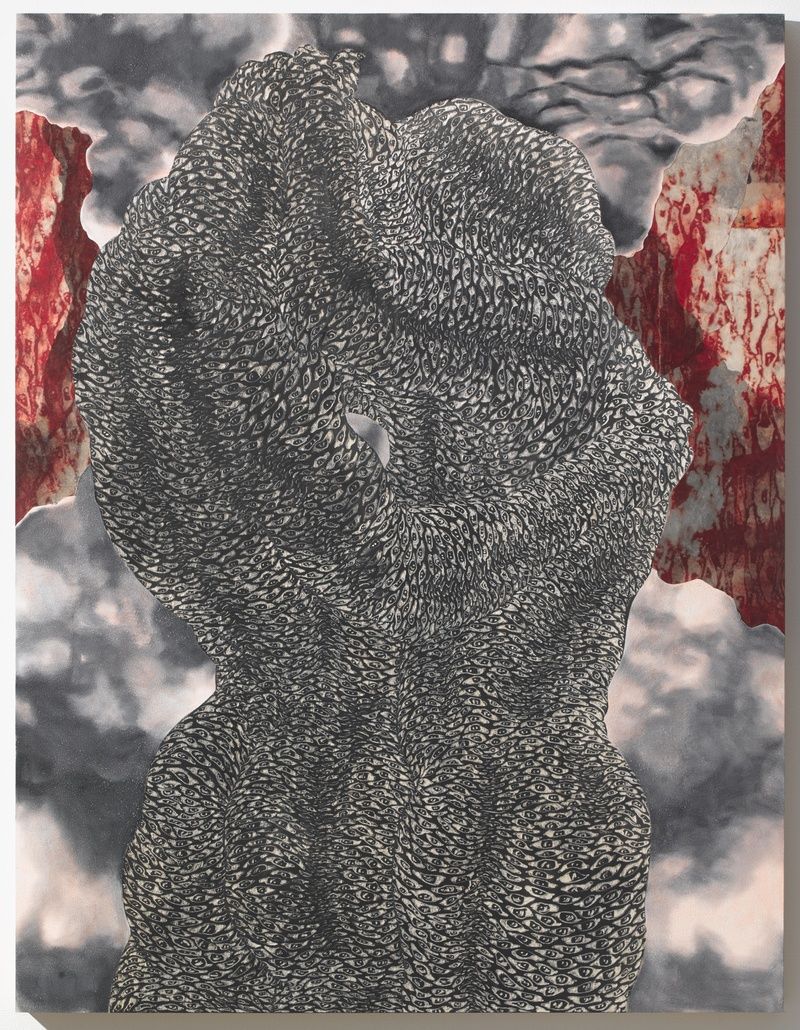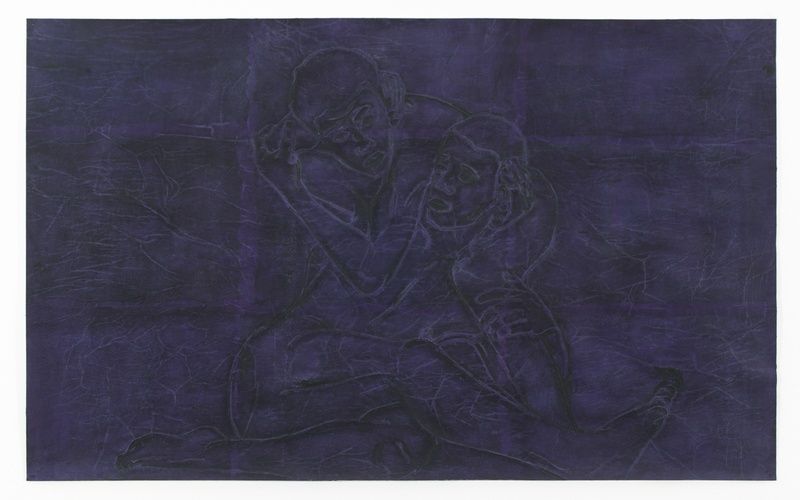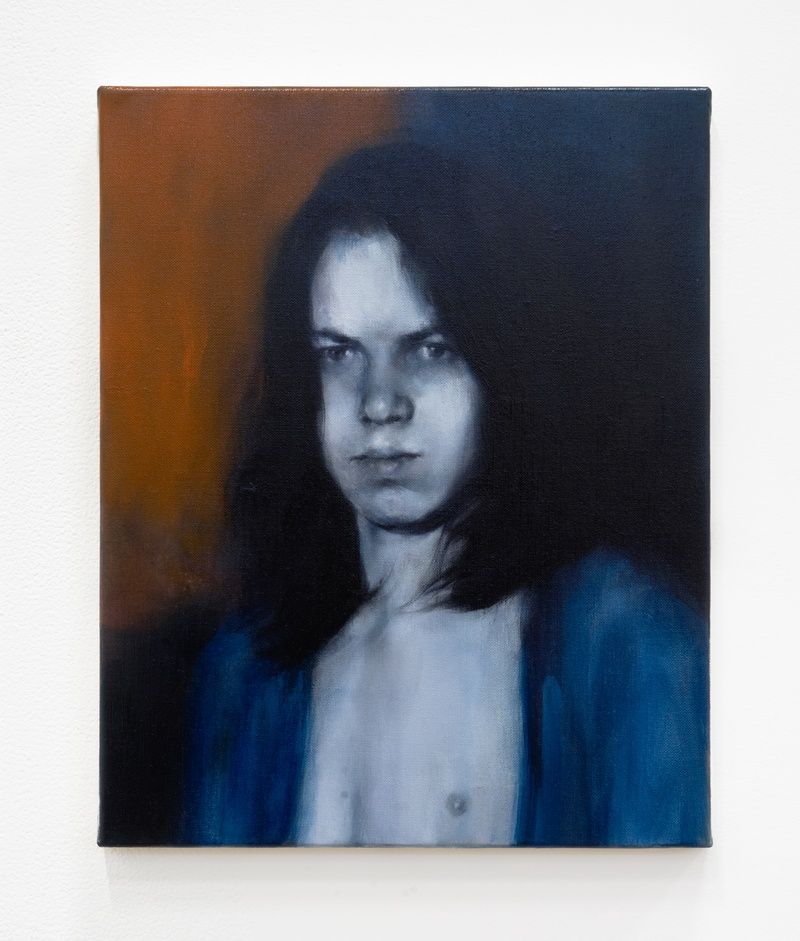James Fuentes Gallery
They Gaze
“What happens when the gaze isn’t the omnipotent gaze of the artist or anonymous viewer—usually male—but the subject of the painting itself? What happens when the painting gazes back and questions its audience? If the gaze emanates from a position of alterity and not authority, is the viewer more or less shaken?” —Jamieson Webster
In a culture of social media-condoned surveillance, this exhibition seeks to redefine the question of the gaze through works by Felipe Baeza, Hernan Bas, Somaya Critchlow, Celeste Dupuy-Spencer, Louis Fratino, Alex Gardner, Henry Gunderson, Paul P., Yves Tessier, Didier William, Chloe Wise, Harumi Yamaguchi, and Lisa Yuskavage.
Felipe Baeza (b. 1987 Guanajuato, Mexico, lives in New York) combines painting and printmaking to examine how states of hybridity and fugitivity form through processes of migration, displacement, and memory. The figures in his works describe moments of self-emancipation, constructing new imaginaries that transcend the hostility of circumstance. Baeza is currently featured in a solo exhibition at Fortnight Institute, New York, and in Nobody Promised You Tomorrow: Contemporary Art in the 50th Year of the Stonewall Era at the Brooklyn Museum. He received a BFA from The Cooper Union and an MFA from the Yale School of Art. He currently lives and works in New York.
Hernan Bas (b. 1978 Miami, lives in Detroit) makes highly detailed and expressionist paintings of dandyish, adolescent adventures that weave together the paranormal, classical literature, religious stories, and mythology. Carrying an ambiguous and implicit eroticism, the figures in his works appear over time, taking on their own transitional lives. Solo exhibitions of Bas’ works have been presented at Centro De Arte Contemporáneo Málaga, Málaga, Spain (2018); SCAD Museum of Art, Savannah, GA (2017); Bass Museum of Art, Miami, FL (2013); and the Rubell Family Collection, Miami, FL (2007), which traveled to the Brooklyn Museum (2008). Bas was included in the Nordic and Danish Pavilions at the 53rd Venice Biennale (curated by Elmgreen & Dragset, 2009), and the 2004 Whitney Biennial.
Somaya Critchlow (b. 1993, London, lives in London) explores the portrayal of the self through an imagistic world-building. Critchlow’s paintings create an open-ended, circuitous narrative that push at the psychological aspects of the body’s portrayal in popular media. Through her depictions of curvaceous, exaggerated heroines, she simultaneously combines and subverts the cultural expectations of race, gender, and power typically upheld within the lineage of portraiture. Critchlow has exhibited at Efrain Lopez Projects, Chicago (2018); the Pignano Residency, Voltera Pisa, Italy (2017), the 2017 Folkestone Triennial, England; and ArtLacuna, London (2016). She will have upcoming solo presentations at Fortnight Institute, New York and Maximillian William, London (2020).
Celeste Dupuy-Spencer (b. 1979, New York, lives in Los Angeles) makes paintings and drawings that serve as snapshots saturated with the details of everyday experiences. Her figurative work holds an inventory of deeply-layered memories and moments that, when brought to the fore, seems to enact a therapeutic release. Dupuy-Spencer paints people—often friends, lovers, family, or favorite sports teams—generating an ever-evolving microcosm of life in the US and the nature of the people that live in it. She has exhibited work at the San Francisco Museum of Modern Art; Nino Mier gallery and Artist
Curated Projects in Los Angeles; the Leslie-Lohman Museum, Invisible Exports, and Malborough Contemporary in New York; and was included in the 2017 Whitney Biennial.
Louis Fratino (b. 1993 Annapolis, MD, lives in New York) draws upon personal experience and photographic source materials to make works often depicting the male body in various intimate settings. Playing at the visual tensions between two-dimensional planes and three-dimensional forms, his scenes range from from the mundane to the graphically sexual, becoming spaces of charged intimacy. Recent exhibitions include Sikkema Jenkins & Co., New York; Antoine Levi Gallery, Paris; and MAN Museo d’Arte Provincia di Nuoro, Italy. He is a recipient of a Fulbright Research Fellowship in Painting
(2015-16).
Alex Gardner (b. 1987, Long Beach, CA, lives in Long Beach) makes paintings of mysterious figures, their facial features omitted to suggest a “de-inviduated" and “universalized” sensibility. Gardner's figures demonstrate a possibly bionic or artificially intelligent nature, reflecting the fluidity of the body in new light. Both welcoming and disturbing notions of the universal human experience, his works offer poignant moments filled with a careful awareness of gesture, detail, and shadow. Recent exhibitions include The Hole, New York; New Image Art, Los Angeles; and The Dot Project, London, among others.
Henry Gunderson (b. 1990 San Francisco, lives in New York) makes paintings that offer voyeuristic and emblematic reproductions of ambiguous objects. Attempting to touch upon the intimacy of technology and design through examining our relationships to objects up close, Gunderson approaches peculiarities as details to enliven and intervene into. Gunderson has exhibited work at Jessica Silverman Gallery, San Francisco; Loyal Gallery, Stockholm; and Fisher Parrish Gallery, Brooklyn, among others.
Paul P. (b. 1977 Ontario, Canada, lives in Paris) is known for his landscape and figurative work incorporating a range of influences, from 19th-century painting to gay pornography. P.’s sensitively rendered paintings, as well as sculptural works in the form of furniture, address themes of identity, desire, transience, and gender. The figures in these intimate portraits appear as if from another time or place. P. was included in the 2014 Whitney Biennial, as well as in exhibitions at The Museum of Modern Art, New York; The Power Plant, Toronto; the Freud Museum, London; Daniel Reich Gallery, New York;
Marc Selwyn Fine Art, Los Angeles; and Maureen Paley, London. His work is in the collections of The Museum of Modern Art, the Whitney Museum, The Brooklyn Museum, the Museum of Contemporary Art Los Angeles, and the San Francisco Museum of Modern Art, among others.
Yves Tessier (b. 1955 Montréal, Canada, lives in Montréal and Harlem) uses casein paint on aluminum and wood to create flattened narrative scenes that have been sourced from imagination, real-world observation, and popular culture. Ambiguity is a central theme in Tessier’s work, proposing a world that seems at once archaic and contemporary. The works range in tone—from humorous to erotic to meditative—featuring stylized figures that have been reduced to their essential elements yet preserve a distinct vitality and presence. Tessier has been included in exhibitions at Shrine, New York; Montréal
Museum of Fine Arts; ART 45, Montréal; and Galerie Laroche/Joncas, Montréal.
Didier William (b. 1983 Port-au-Prince, Haiti, lives in Philadelphia) combines carved, painted, collaged, and drawn surfaces, testing the limits of painting itself. His multi-layered scenes draw on cultural and religious references, personal memories, and larger historical touch-points. Over time William has developed a distinct and ever-morphing visual language, pushing at the bounds of abstraction and readability in describing the body. He has exhibited work at the Pennsylvania Academy of Fine Arts, the Bronx Museum of Art, and Deitch Projects, among others. In 2018 he received the Rosenthal Family Foundation Award in Art from the American Academy of Arts and Letters. William will be featured in a solo presentation at Art Basel Miami Beach, NOVA with James Fuentes later this year.
Chloe Wise (b. 1990, Montréal, Canada, lives in New York) makes paintings, sculpture, video, and installations foregrounded by an interest in the history of portraiture. Her works examine the multiple channels of consumption and image-making that lead to the construction of a self. Containing a wry sense of humor and tension, her portraits emphasize how the body is framed and becomes excessive in its (self-)manipulation. Wise has been included in exhibitions at Zabludowicz Collection, London; Jeffrey Deitch, Miami; Almine Rech, London and Paris; Galerie Sébastien Bertrand, Geneva, among
others.
Harumi Yamaguchi (b. 1941 Matsue, Japan, lives in Tokyo) is known for her depictions of female figures using airbrush techniques since the 1970s, establishing herself as an illustrator that symbolized the era. Yamaguchi’s portraits deconstruct the gaze that lands upon them through their exaggerative depictions, presenting her subjects as neither entirely sex objects nor chaste symbols. Rather, they interact with the markers of consumer culture, becoming ambiguous idols. Yamaguchi has exhibited work at Nanzuka, Tokyo; Nottingham Contemporary; and PARCO MUSEUM, Tokyo; and is included in the collections of the Museum of Modern Art, New York and Walker Art Center, Minneapolis, among others.
Lisa Yuskavage (b. 1962 Philadelphia, lives in New York) has dealt with complex questions around depiction, subjecthood vs. objecthood, staging, and figuration since the 1980s. Grappling with art historical precedents and conventions of the genre, her simultaneously eccentric, exhibitionist, and introspective characters assume dual roles of subject and object, complicating the position of the viewer. In 2015 The Rose Art Museum presented a 25-year survey of her work, traveling to the Contemporary Art Museum St. Louis. Yuskavage is in the collections of The Metropolitan Museum of Art, The Museum of Modern Art, the Whitney Museum, the Museum of Contemporary Art Los Angeles, the Hammer Museum, San Francisco Museum of Modern Art, Art Institute of Chicago, Hirshhorn Museum and Sculpture Garden, Institute of Contemporary Art Boston, and Rubell Family Collection, Miami, among others.
Special thanks to the artists and lenders to the exhibition; Maureen Paley, London; Maximillian William, London; Marlborough Contemporary, New York; Nino Mier Gallery, Los Angeles; The Hole NYC; Cooper Cole, Toronto; Shrine, New York; Nanzuka, Tokyo; and David Zwirner, New York.
Works

Didier William
Me, Him and the Cloud, 2019
Acrylic, wood carving, collage on panel
52 × 40 inches

Felipe Baeza
Naj Tunich, 2018
Ink, twine, acrylic, glitter on paper
48 × 77.5 inches

Alex Gardner
Accountability Zero, 2019
Acrylic on canvas
60 × 48 inches

Paul P.
Untitled, 2019
Oil on canvas
16 × 13 inches